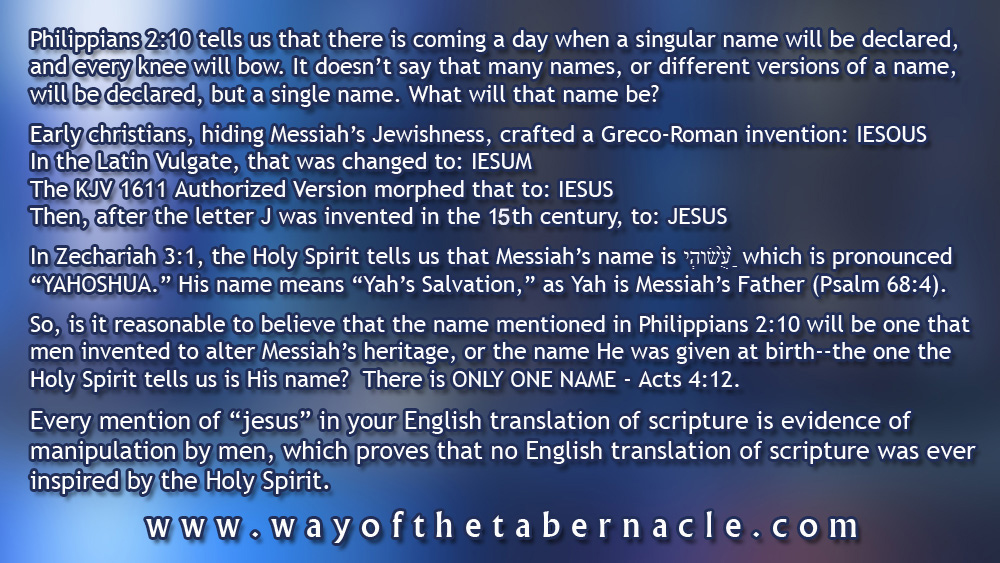Was the KJV Inspired by the Holy Spirit?
Because of erroneous teachings within so much of the “church,” many people have a wrong understanding of what the scriptures are, to whom they are written, and how they are to be used in the lives of believers. This lack of spiritual understanding has produced some people within the “church” who falsely believe that the King James Version (translation) of the scriptures is inspired, inerrant, and/or perfect. They don't even consider it a translation, because they foolishly believe that the Holy Spirit Himself “re-inspired” the scriptures into the English language, and the result is their King James Version.
These folks are commonly referred to as “King James Version Only,” and bear many cult-like qualities. At the very least, they are guilty of idolatry, as they regard something that was created over the Creator Himself. At the heart of their heresy is a fundamental lack of understanding about the role and authority of the Holy Spirit, so they put their English translation of scripture into His role.
I recently found myself on the website of a KJVOnlyer, and I found this specious claim on it, which, sadly, is quite typical. It stated, “FACT: No one has ever proven that there are errors and contradictions in the KJV. Many "Christian" colleges and preachers have a nasty habit of pointing out APPARENT contradictions to their people, but these arguments have been disproven so many times that it is nothing less than disgusting to hear them still being used.”
This is the exact same type of “argument” that liberal pundits use to shut down discussion—to claim that even raising the question is “disgusting.” The biggest problem with this statement is that it is blatantly false. There are myriad online resources that demonstrate multitudes of translation errors, and outright deception, in the King James Version. If a written source contains errors, then, by definition, it cannot be inspired by the Holy Spirit, and cannot be called “inerrant,” or “perfect.” Just claiming that something doesn't have errors doesn't make it so—and, with so many instances of the errors in the KJV exposed, it seems quite foolish to claim that it has no errors.
There are many, many resources available by simply searching the internet, but here, we will look at some specific ones, and explain why the translations of specific words in the KJV are false. And, if there is only one error, then the entire volume CANNOT have been inspired by the Holy Spirit.
In Acts 12:4, the usage of “Easter” in the KJV is blatant error.
Now, if you bring up this point with a KJVOnlyer, he will likely repeat to you a common, but false, churchian argument that, according to the passage, the Passover (14 Nisan) had already passed, so Herod was waiting for the Easter celebration he observed to pass before bringing Peter out before the Jews. The false assumption is that, since the scripture states it was the “days of Unleavened Bread,” and since the Feast of Unleavened Bread follows the observance of the Passover (which is the preparation day for Unleavened Bread), then it must be stating that 14 Nisan had already passed.
The reason Herod would have waited to bring Peter out before the people was because it was Spring festival time for the Jews (Passover, Unleavened Bread, and Firstfruits). Herod decided to wait until after their Spring feasts. It had nothing to do with the pagan Easter, as the Jews didn't celebrate that, so Herod would have had no reason to wait, where the people were concerned.
And, we can see in Luke 22:1 what the Jews called the ENTIRE WEEK:
“Now the feast of Unleavened Bread drew nigh, which is called the Passover.” The terms “Passover” and “Unleavened Bread” were synonymous to the Jews. They used either term to describe the Spring festival week.
So, in Acts 12:4, the usage of “Passover” is referring to the entire week (like in Luke 22:1), and it has nothing to do with 14 Nisan having passed. Moreover, the “days of Unleavened Bread” used in Acts 12:3 means that James had been killed and Peter taken before 14 Nisan, as the “days of Unleavened Bread” referred to the entire week, just like the usage of “Passover” did.
The Greek word in Luke 22:1 is pascha (πάσχα), which is the same word used in Acts 12:4. There was no Greek word for Passover, which in the Hebrew is pesach (פּסח), so the Greek "pascha" is only a transliteration of the Hebrew "pesach." As it is only a transliteration, the meaning of the word is what it means in its language of origin. In Hebrew, the word pesach can ONLY mean Passover. It can NEVER mean Easter.
The evil one has deluded the minds of KJVOnlyers so that they twist the literal meaning of the ancient word. Since churchians have pervaded culture since the early centuries, and their irrational hatred of the Jews caused them to reject anything that was associated with the Jews, the Greek word "pascha" was bastardized and perverted in the modern romantic languages to be synonymous with Easter. Not only is that just an outright lie, here's a major problem with that lie: the Passover memorializes a death--the sacrifice of the Perfect Lamb. Easter celebrates a resurrection, not a death. So, they cannot be synonymous.
Moreover, the resurrection that is celebrated by the pagan Easter/Ishtar is that of Tammuz, not Messiah. Yahoshua the Messiah was crucified on Passover and He rose again on the Feast of Firstfruits. There is no room there for any "Easter," as that is merely Satan's counterfeit, just like all of the pagan Roman Catholic holydays that her Protestant daughters observe.
Therefore, the usage of the word "Easter" in the KJV translation of Acts 12:4 is an error, and thus, cannot be inspired by the Holy Spirit.
Where justification is concerned, the word is "sin," not "sins."
In the Greek, the word for the one sin that condemns people to hell (unbelief) is "hamartia." To repent of hamartia (unbelief) is to believe, and that is what will save someone. Being born again has nothing to do with stopping any sins of the flesh, like lying, stealing, adultery, or even murder. Those are things that one who has already been made a child is told to sacrifice. But, whether those sacrifices are made doesn't determine if someone is a child.
So, every scripture that deals with justification, the sin is "hamartia" (unbelief), and should be translated "sin." It refers to a condition, which is singular, not actions, which are plural. There are no works that can either save or condemn someone. That is determined by belief or unbelief. After one has been made righteous in the Father's eyes by the indwelling Holy Spirit, it is the Father's desire that the child make himself holy, which is to sacrifice the flesh—stop committing sins of the flesh, and deny the flesh of the things it desires. Those sins of the flesh are the sins NOT leading unto death, while unbelief is the sin that leads unto death.
Thus, Matthew 1:21 should read: And she shall bring forth a son, and thou shalt call his name YAHOSHUA: for he shall save his people from their SIN.
And, 1 John 1:9 should read: If we confess our SIN, he is faithful and just to forgive us our SIN, and to cleanse us from all unrighteousness. This can be understood properly as “sin” because to be cleansed from all unrighteousness is the act of justification, so that's what this verse is referencing.
With this error—sins vs. sin—we can look at it as one error committed many, many times, or many errors throughout the translation—but, let's be clear, it is error, and any error proves that the volume is not inspired by the Holy Spirit.
Names of actual people do not get translated.
One of the most wily deceptions Satan has committed against humanity is to convince so many people that names of actual people get translated based on the language one speaks. All it takes is a bit of thoughtful consideration about such an absurdity, and the deception will become readily identifiable.
YOUR name doesn't change simply because somebody else speaks a different language. NOBODY'S name does. Occasionally, a fictional character might be changed when a book is translated into another language, but NEVER does that happen with actual people.
Because the earliest churchians harbored bitter hatred against the Jews, they did everything they could to alter the scriptures to separate them, as much as possible, from anything that sounded “Jewey.” One of the things they did to accomplish that, and make the scriptures fit into a Greco-Roman mindset, was to change most of the names of the people who are included in scriptural accounts.
So, names like Matthew, James, and John were actually Mattityahu, Yakov, and Yochanan. Every English sounding name in your English translation of the scriptures is false, because people's names don't change due to language. The names they are given are their names. Again, only fictional characters' names are changed because of languages,so, Satan has succeeded in equating the actual people spoken of in the scriptures with fictional characters in the understanding of many people. Even if such people don't realize that, it's the way their subconscious perceives it, since nobody would knowingly alter somebody's real, given name--unless it was never an actual person to begin with.
Where the names of all the people in scripture are concerned, they don't possess eternal significance in our lives, but, the names of the Creator and His Son DO hold eternal significance, based on the importance scripture places on their names. We are told to call upon the name of the Father, and to believe on the name of the Son. But, how can we do that if we don't actually know their names? This is why Satan has done everything he can to obfuscate those names through the promulgation of false churchian translations and traditions.
The Father's name is Yah, according to Psalm 68:4, and His Son's name is Yahoshua, which means Yah's salvation. These names, and some of the problems of using false ones, are explained more in depth here and here. Suffice it to say, though, that the altering of names in the English translation of scripture is further proof that it was not inspired by the Holy Spirit, as the Holy Spirit would never inspire that which is false—and the names used throughout the KJV are not the actual names of those people, and are, thus, false.
KJVOnlyism falsely equates a translation with the role and authority of the Holy Spirit.
Most KJVOnlyers, actually, even most churchians, don't know the difference between the Greek logos and rhema, as they are both translated into English as “word.” In Hebrew, the dabar and the imrah are also translated as “word.” In neither language are the words synonymous, as their meanings are quite different from each other. The rhema, or imrah, are the utterances of Yah, but the focus is on the words themselves, while the logos, or dabar, are the utterances of Yah, with the focus being on the speaker—the one speaking those utterances.
So, the Word (dabar) who came and spoke to the prophets Jonah and Ezekiel is the same Word (logos) who instructs the bride today. He is the one who inspired the scriptures, so within the scriptures the Living Word (logos) inspired the written word (rhema).
Hebrews 4:12 tells us “For the word (logos) of Yah is quick, and powerful, and sharper than any twoedged sword, piercing even to the dividing asunder of soul and spirit, and of the joints and marrow, and is a discerner of the thoughts and intents of the heart.” The average churchian or KJVOnlyer wrongly believes this verse to be speaking of their Bible, but it is not, as the logos is not anything written. To the bride, the logos is presently the Holy Spirit.
How were people saved before the advent of the printing press?
Before the advent of the printing press, very few people even saw a book, let alone owned one. And, most couldn't read or write. So, according to the KJVOnlyers, none of those people could know they were saved, or understand the Father's will for their lives, since those things are found only in their KJV. KJVOnlyers also falsely believe that their English translation is the only inspired version of the scriptures, which means that anyone who doesn't speak English has no access to the Spirit's truths.
As has been demonstrated here, there are many errors in the KJV, and therefore, it cannot be something that was inspired by the Holy Spirit. Ask most any KJVOnlyer why they think they are saved, and they'll tell you that they know they're saved because their KJV tells them so. But, NO book can tell anybody he is saved—only the Holy Spirit can do that. The scriptures teach HOW someone CAN be saved, but it can tell nobody that he is a child of Yah. That is the role and authority of the Holy Spirit, but again, to be a KJVOnlyer is to replace that role and authority with an English translation of the scriptures.
The likely reason the KJVOnlyer has to put that faith for his salvation in a book is that he has never actually been told by the Holy Spirit that he has been redeemed. The Pharisees also believed their salvation was in the written words of scripture, but Christ told them in John 5:39 that salvation is not in the scriptures.
The scriptures are Yah's written instructions to His children, but without the instruction of the Holy Spirit, the spiritual meanings of the scriptures will not be understood. Before Luke 24:45, the disciples knew the physical words of the scriptures, but it wasn't until the Spirit opened their understanding that they grasped the spiritual meanings of those scriptures.
Many KJVOnlyers also believe in “sola scriptura,” which is the notion that “scripture alone” is sufficient to understand spiritual truth. Since all scripture was inspired by the Holy Spirit, then 1 Corinthians 2:14 makes it clear that only those who are led by the Spirit will understand the true meanings of His scriptures (But the natural man receiveth not the things of the Spirit of Elohim: for they are foolishness unto him: neither can he know them, because they are spiritually discerned). So, scripture alone is not sufficient—one must be taught by the Author, who is the Holy Spirit.
While there are many resources online that illustrate the many errors of translation and even deceptive alterations, these that are presented here are sufficient to demonstrate that the KJV is nothing more than an English translation of scripture that was created by men. While it is a fairly reasonable translation, it does contain errors, it is not perfect, and it is not inspired by the Holy Spirit. Only the original autographs were inspired by the Holy Spirit.


Written by Dean Haskins for Way of the Tabernacle. Reproductions with proper attribution are allowed and encouraged.
Salvation
Traditions
Other Truths
But now in Yahoshua the Messiah you who formerly were far off have been brought near by the blood of Christ. For He Himself is our peace, who made both groups into one and broke down the barrier of the dividing wall, by abolishing in His flesh the enmity, which is the Law of commandments contained in ordinances, so that in Himself He might make the two into one new man, thus establishing peace, and might reconcile them both in one body to Yah through the cross, by it having put to death the enmity. Ephesians 2:13-16




